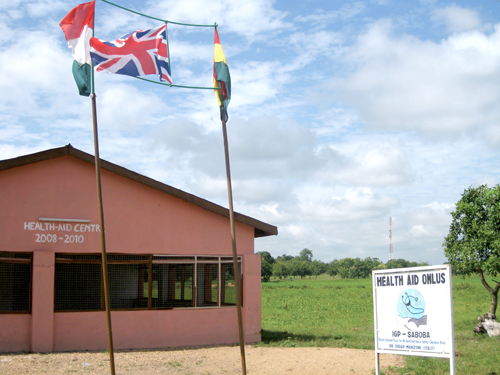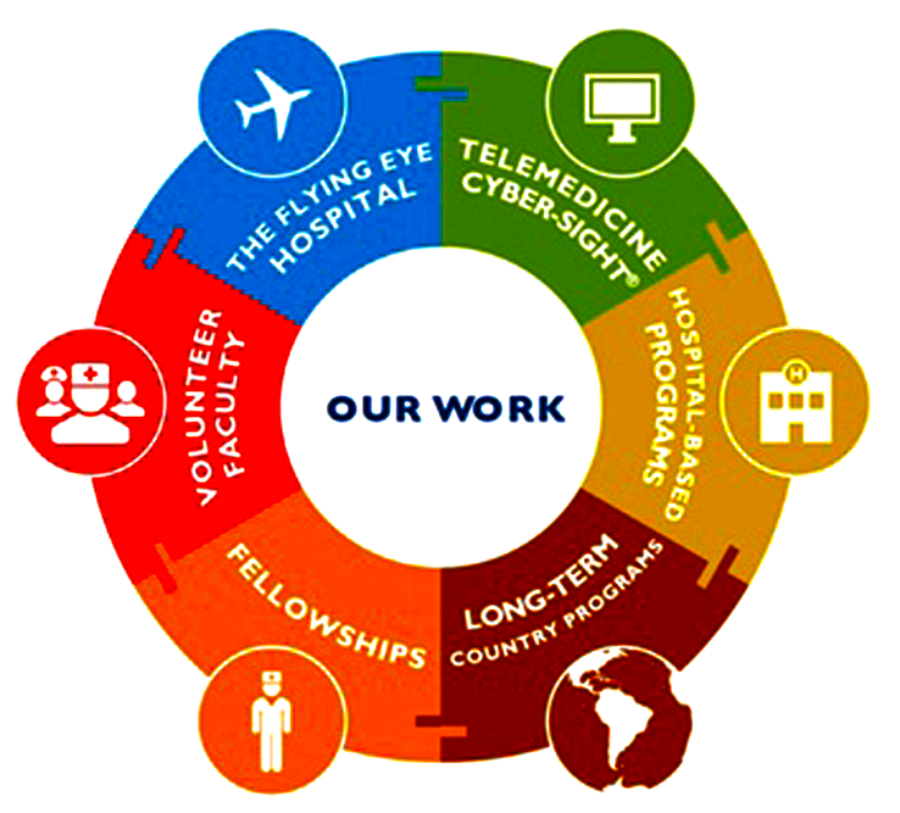After the second year of medical school, I spent my summer vacation working as a volunteer for a small Italian non-government organisation (NGO), named HEALTH-AID. As part of my volunteering experience, I joined a team of European doctors, medical students and nurses who provided free healthcare to Ghanaians living in deprived areas in the Saboba-Chereponi District in Northern Ghana.
HEALTH-AID is a privately funded NGO that aims to support Ghanaians who are unable to afford the membership of the National Health Insurance Scheme (NHIS), which was implemented in Ghana in 2004 [1]. The NHIS was designed to ensure access to basic healthcare services to all Ghanaians. Unfortunately, not all inhabitants are able to afford the annual membership fee, which roughly converts to 10 GBP. As a result, a relatively large number of Ghanaians struggle to receive even the most basic healthcare services, especially in the more rural regions in the North.
One example that I repeatedly encountered during my volunteering work was the lack of hepatitis B immunisations. It is estimated that 15.6% of Ghanaian children may be infected with the hepatitis B virus [2] and similarly, many of our very young patients tested positive for the infection. I was alarmed to learn that this high prevalence existed despite the implementation of the ‘Expanded Programme on Immunization’, which aims to vaccinate all pregnant women and children against the virus on a national level [3].
Working for HEALTH-AID
HEALTH-AID provides immediate healthcare services to a deprived patient population by two means. Firstly, HEALTH-AID volunteers provide free consultations and treatments in the Health-AID Centre, which is based in Saboba. Patients from neighbouring villages travel to the clinic to receive healthcare via a drop-in system. Secondly, each day a team of doctors and nurses travels to more remote villages via outreach programs. I was lucky enough to be able to participate in both types of interventions. Some consultations were very rewarding as we were able to provide adequate treatments or reassure anxious patients.
However, the experiences I had were also difficult at times as our resources were limited and there were many patients whom we could not help. Unfortunately, our stock of medicines was restricted and consisted primarily of antimalarials, antibiotics and analgesics. Accordingly, during our consultations at the health centre and the outreach programmes, we encountered numerous patients who could not benefit from our limited resources. At times, I found this experience very challenging, as it was frustrating to come to the realisation that our efforts remained merely a drop in the ocean. Even though I knew that we did help some patients, it was very difficult to leave Ghana, knowing that there were so many more patients who we could not help.
The HEALTH-AID Centre located in Saboba, Ghana.
Capacity building in Ghana
However, the focus of HEALTH-AID is not merely the provision of healthcare to deprived areas on an ad hoc basis, but importantly, the organisation also targets capacity building. The NGO aims to have a more sustainable and far-reaching impact by providing health education. Personally, I was involved in delivering workshops to Ghanaian teachers and high school students and travelled to local villages to deliver speeches and facilitate discussions within the community. These ‘health topics’ were quite varied in nature and included the prevention of HIV, hepatitis B and malaria; the importance of hygiene; and the treatment of dehydration. These teaching opportunities proved to be very enjoyable.
On some occasions, my health talks about the use of condoms in the prevention of HIV/AIDS sparked passionate debates between male and female groups of villagers and I was very grateful to be a part of these dynamic exchanges. However, the interaction with the villagers also gave me a better understanding of the obstacles the people encounter, which prevent them from implementing our health recommendations.
The experiences I had during these workshops and speeches were some of the most rewarding and valuable ones as they gave me the feeling that I contributed to laying down the groundwork for improving the health of their community in a more sustainable way. Therefore, even though we left so many people without treatment, I was able to leave Ghana with the feeling that our team contributed to a better future for their community.
Ophthalmology in the developing world
I am glad to have seized the opportunity to gather volunteering experiences in the developing world as a medical student. However, I believe that as a doctor, I can be more actively involved in capacity building, as I will be able to use my skills and knowledge to deliver more targeted teaching and therefore contribute to projects, which focus on capacity building in deprived communities. One of the many reasons why ophthalmology is such an attractive career option is that there is ample opportunity to deliver healthcare to populations in need and to contribute to the improvements of ophthalmic institutions in developing countries. The World Health Organisation (WHO) states that 285 million people worldwide are visually impaired and that 90% of these live in developing countries. Globally, the main causes of visual impairment are uncorrected refractive errors, whilst cataracts remain the leading cause of blindness in low and middle income countries. Notably, 80% of all visual impairment can be cured [4].
The International Agency for the Prevention of Blindness (IAPB) and ORBIS international
The IAPB was established in 1975 as a leading umbrella organisation to co-ordinate the international efforts to prevent blindness. In collaboration with the WHO, a global initiative was founded, VISION 2020: The Right to Sight. ORBIS International is a key organisation within the IAPB Council of Members that targets some of the world’s most under-served areas. It aims to strengthen local eye care institutions, introducing ophthalmic technology, training local staff, increasing public awareness about eye health, and advocating for supportive policies [5].
ORBIS International devotes itself to the elimination of the causes of avoidable blindness. ORBIS works with its local partners to establish sustainable eye care in Bangladesh, China, Ethiopia, India, Latin America and the Caribbean, South Africa, Vietnam and Zambia. The organisation treats cataracts, diabetic retinopathy, glaucoma, retinopathy of prematurity, strabismus and trachoma.
The six key components of ORBIS International.
Reprinted with permission from ORBIS International.
The History of ORBIS International
The story of ORBIS International begins in 1973, when Dr David Paton first envisioned a flying eye hospital. Dr Paton, the head of the ophthalmology department at Baylor College of Medicine in Texas, had extensively travelled throughout the developing world as a visiting faculty member and was concerned over the state of ophthalmic services and teaching in developing countries. He observed that most doctors and nurses in developing countries could not afford the high costs of tuition, international travel and accommodation that are involved in ophthalmic training. Dr Paton’s solution was a mobile eye hospital, which allowed doctors to bring their knowledge and skills to their colleagues in developing countries through lectures and hands-on experience.
Dr Paton shared his idea with his good friend and college classmate, Betsy Trippe DeVecchi. In turn, Betsy sought the advice of her father, Juan Trippe, the founder of the Pan American Airways. Mr Trippe turned the idea into reality by inviting AL Ueltschi, the founder of FlightSafety International, onto the team. AL Ueltschi, Betsy Trippe and Dr Paton then mapped out a plan, which laid down the foundation for ORBIS International. The team secured an airplane, which was donated by Eddie Carlson, Chairman of United Airlines. The airplane was converted into a fully functioning teaching eye hospital with a grant from the US Agency for International Development (USAID) and funds from private donors. In 1982, the aircraft took off to Panama for its first training mission.

The Flying Eye Hospital. Reprinted with permission from ORBIS International.
During the first two years of ORBIS International, the crew flew to 24 countries and largely focused on the transfer of surgical skills. The year 1984 marked a turning point in the history of ORBIS, as the flying eye hospital launched a program in Africa, where there was a severe lack of trained ophthalmologists. Accordingly, ORBIS expanded its mission to not only focus on teaching surgical skills to ophthalmologists but also enhancing the skills of the broader ophthalmic community. Specialised training programs were targeted at ophthalmology assistants, nurses, public health workers and biomedical engineers, who played a major role in providing eye care services.
In 1985, ORBIS further broadened its scope by launching more and more programs without the plane. ‘Off the plane’ surgical, nursing and community programs were launched in countries that had been previously visited by the plane or were not easily accessible by plane. Another milestone was reached in 1986, when ORBIS strengthened its focus on the prevention of blindness and public health. To promote eye care as an integral part of overall healthcare, a community health department was created at ORBIS headquarters, and community eye care programmes were established. In the late nineties, permanent ORBIS offices were launched in Ethiopia, Bangladesh, China, India and Vietnam. These offices are run by local staff and aim to improve the quality and accessibility of eye care to local residents. The projects are run throughout the year and many focus on the treatment and prevention of childhood blindness, cataract, trachoma and corneal disease.
Capacity building
Capacity building is one of the key elements of ORBIS International. The organisation aims at building long-term capabilities of ophthalmic institutions in developing countries. This is achieved by collaborating with NGOs, community-based organisations and the private sector, as well as local and national governments. The ultimate goal is to reach a state, where the partner country can independently provide quality eye care. There are six key components to ORBIS’s capacity building efforts, as shown in the diagram.
Getting involved
You can help to save sight on board the ORBIS Flying Eye Hospital or through a Hospital Based Programme. Medical volunteers can share their expertise with colleagues in developing countries through surgical demonstrations, wet lab supervision, consultations, lectures and workshops. ORBIS are always looking for qualified and motivated eye care professionals for a wide range of both medical and non-medical positions. Opportunities include specialised ophthalmologist, ophthalmic nurses, anaesthetists, biomedical engineers, ophthalmology residents and fellows. Please see the ORBIS webpage for more information about the application process [6].
Acknowledgements
The author would like to thank ORBIS for allowing the use of information published on their website.
References
1. Sodzi-Tettey S, Aikins M, Awoonor-Williams JK, Agyepong IA. Challenges in provider payment under the Ghana National Health Insurance Scheme: a case study of claims management in two districts. Ghana Medical Journal 2012;46(4):189.
2. Blankson A, Wiredu EK, Gyasi RK, et al. (2005). Sero-prevalence of Hepatitis B and C viruses in cirrhosis of the liver in Accra, Ghana. Ghana Medical Journal 2005;39(4):132.
3. Ghana Health Service:
www.ghanahealthservice.org/epi.php
Last accessed February 2014.
4. Fact Sheet N°282. The World Health Organization.
www.who.int/mediacentre/factsheets/fs282/en/
Last accessed February 2014.
5. The International Agency for the Prevention of Blindness:
www.iapb.org
Last accessed February 2014.
6. ORBIS International.
www.orbis.org.uk
Last accessed February 2014.
Declaration of Competing Interests: None declared.
COMMENTS ARE WELCOME







